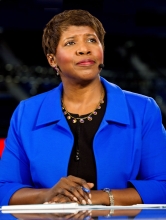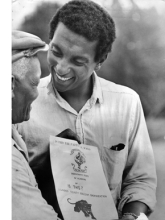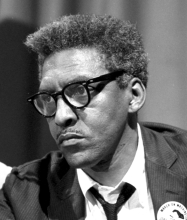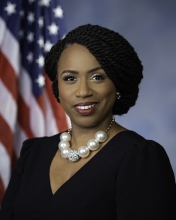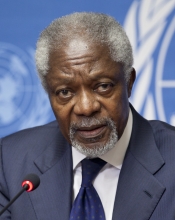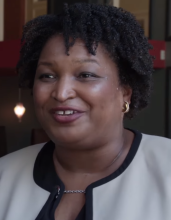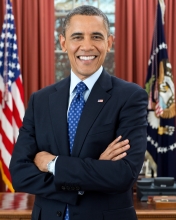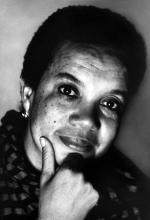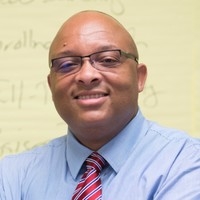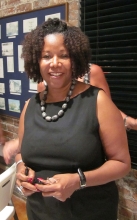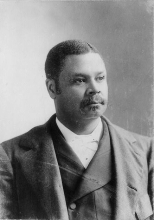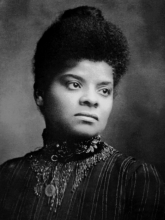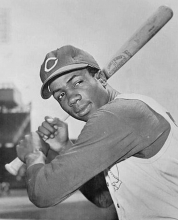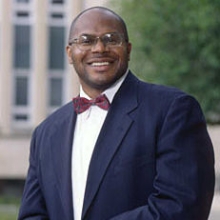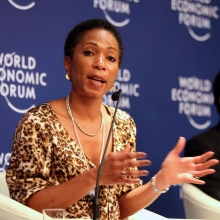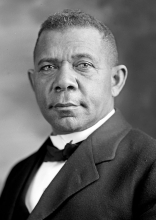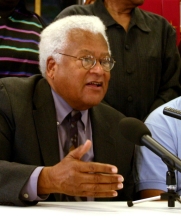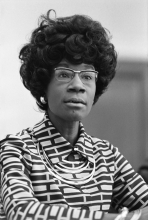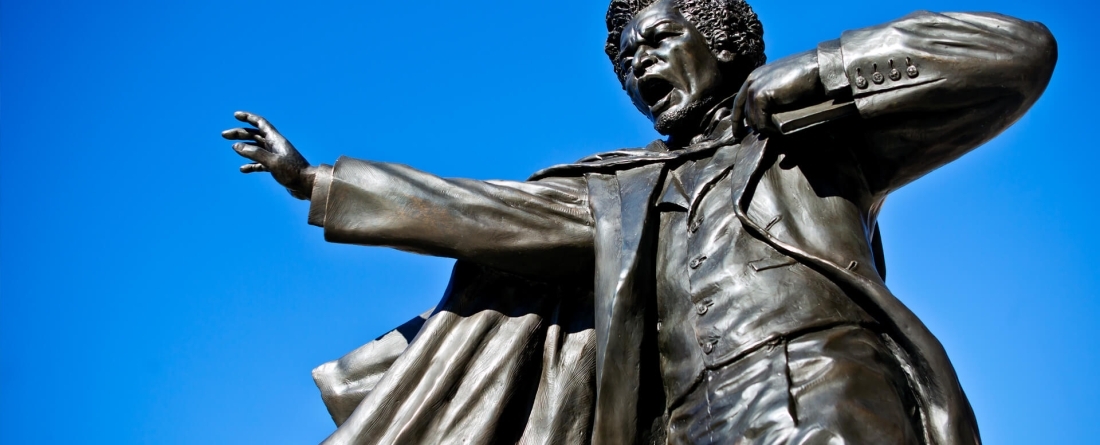
February is Black History Month, which presents an opportunity to recognize and celebrate the contributions of African Americans to the United States and the world. We at SPP want to think, in particular, about the myriad ways that black Americans have shaped public policy. This month, SPP is highlighting the contributions of African Americans to the public policy field, the U.S. and the world.
We asked the SPP community to share who inspires them — someone famous or someone less known, someone from the recent past or the distant past, someone who shaped public policy as an elected official, bureaucrat, community organizer, activist, voter, or scholar, or someone working at the local or national level.
Below, find the inspiring voices that we are celebrating, this month and year-round, and what they mean to our Policy Terps community.
How does this person inspire you?
Gwen helped lay the foundation for women of color to be seen as policy experts and had the courage to host her own program to inform communities about policy issues that affected their lives, in today's climate, I hope to embody her courage and leadership in my classroom.
How do they connect to your work?
She was one of the first Afro-Latina to host her own nationally televised public affairs hour helping to inform the nation of issues that affected their communities. The work she did to inform the nation while never losing her identity is what I hope to do with my research and teaching.
How does this person inspire you?
Stokely is apart of a generation that revolutionized the Black experience in this country. His quote; “Our grandfathers had to run, run, run. My generation's out of breath. We ain't running no more,” reminds me that we act not only for ourselves, but for our past and future as well.
How do they connect to your work?
Carmichael is a Caribbean immigrant, like my family! His message is one that I have heard repeatedly growing up on the power of community and coming together. When I work in policy, I also hope to lift and empower communities in order to make sustainable change.
Submitted by Patricia Bory
Lecturer; Chief Diversity & Inclusion Officer; Director, iGive Living-Learning Program
How does this person inspire you?
As a gay black man, Bayard Rustin acted as an influential adviser behind the scenes to civil-rights leaders like Dr. Martin Luther King. He was key in the success of the March on Washington, Freedom Rides and helped to organize the Southern Christian Leadership Conference (SCLC). Even when he was criticized and shunned for his sexuality, he carved out a way to be one of the one of the most powerful anchors of the civil right movement, regardless of whether he got credit or not.
How do they connect to your work?
As a member of the LGBTQ+ community I look to Bayard Rustin with immense gratitude for the sacrifices he made and the behind the scenes fight he was willing to fight. He reminds me to keep my organizing background, at the forefront of my teaching, my policy work, and my day to day actions to create social change.
How does this person inspire you?
The first black Congresswoman to represent the state of Massachusetts, Ayanna Pressley personifies courage and honor. By running the Congressional race, she tested political limits where, historically, a black woman would not only have been discouraged, but would legally not have been afforded the opportunity. She is a contributing factor to the recently inspiring actions of the Nation’s House of Representatives, and openly supports policies like universal healthcare and education reform; the absence of these continue to impact marginalized communities on a daily basis.
How do they connect to your work?
As a Federal employee, it’s often easy to lose sight of the big picture. It helps, though, when the picture consists of someone who looks like me and does their job well. It’s inspiring to know that Pressley has contributed to my belief that my voice is powerful and deserves to be recognized.
How does this person inspire you?
I had the great privilege to work for Kofi Annan, the first Black African Secretary-General of the United Nations. He embodied what it means to be a leader. He faithfully executed his role in the "hardest job in the world", and never, never gave up despite immense pressure. He sought to know as many people in his organization as possible, and genuinely cared for them and about them -- whatever their level or job description. He was an immigrant to the United States, and often told the story on himself of learning to trust local knowledge through suffering through a winter in Minnesota trying to avoid wearing strange ear muffs. At the same time, he brought his own experience and cultural traditions to the table. The secret to his leadership success was that he was the single best listener I have ever met. He genuinely listened to people before forming his own views or making decisions. He continues to inspire me to try to be a leader in his image.
How do they connect to your work?
I use the advice and experience I gained as his mentee on a daily basis. Leading an organization is very hard work, with many dimensions, and the leadership package Kofi Annan brought to the world is the gold standard of leadership -- one I aspire to make progress toward every day.
How does this person inspire you?
Stacey Abrams is a complete powerhouse. Through her gubernatorial race in 2018 and her work with Fair Fight Action, I am inspired by her relentless passion for protecting the right to vote for the most marginalized in the country. Stacey Abrams reminds me to never back down from things worth fighting for.
How do they connect to your work?
Currently, I work with nonprofit organizations that focus on gender equity and registering voters. Stacy Abrams is the perfect representation of how Black women should show up in these spaces. I aim to make my voice heard and fight for women of color who desperately need equity and representation in our political processes.
How does this person inspire you?
His integrity and honesty, his inclusiveness and his steadfast belief in the future of the United States are all inspiring. The example of openness and truth telling also serve as an example to me.
How do they connect to your work?
I worked proudly in his Administration on the National Security Council. His rigor and adherence to analysis and evidence means a great deal to me as a public policy professional.
Submitted by Adele Robinson
Clinical Professor; Karabelle Pizzigati Endowed Professorship in Advocacy for Children, Youth And Families
How does this person inspire you?
Marian Wright Edelman is a constant inspiration of a servant leader to give every child a fair start, a healthy start, a head start and a safe start in life in caring families and communities. From civil rights lawyer who brought Robert F. Kennedy to Mississippi to witness poverty firsthand, to founder and director of the nation's first advocacy organization dedicated to eliminating child poverty, Marian is the force behind so many policies that are lifting children out of poverty. The work goes on, but we would not be we are today without her steadfast, strategic advocacy.
How do they connect to your work?
When I started working in education policy, I looked to the Children's Defense Fund as the seminal advocacy organization for poor children and families. To this day, I know of no one like her in her ability to inspire, motivate, and lead.
Submitted by Kathleen Vogel
Associate Professor; Director, Strategic Research Initiatives; Senior Fellow, CISSM
How does this person inspire you?
David is working to create a new NASPAA initiative called NASPAA PhD Pathways, which seeks to encourage and support students of color and those from underrepresented backgrounds to seek doctorate degrees in public affairs/policy/administration and become professors
How does this person inspire you?
I grew up in Georgia and most of my family is from the South. I am blown away by the courage of very young children walking into those schools surrounded by angry mobs. They experienced ostracism and violence every single day from their classmates as well as teachers, administrations and adults in their communities. I am in awe of them and their parents as I cannot imagine watching my child face such a hostile environment. But they did it for the future of our education system. Their bravery is truly something I am grateful for every day. These efforts benefitted everyone, me included, because diverse schools make us all better in immeasurable ways.
How do they connect to your work?
As the Director of Undergraduate Studies I am privileged to work with our amazing and diverse student population. This would not have been possibly without these young heroes and heroines.
How does this person inspire you?
Representative George Henry White (R-NC) has always struck me as perhaps the loneliest man not to have been placed in solitary confinement. An attorney born in 1852, White was elected as a Republican from North Carolina's 2nd Congressional District between 1897 and 1901. White is the last African-American member of Congress during the beginning of the Jim Crow era and the only African American to serve in Congress during his tenure. In North Carolina at the end of the 19th century, "fusion politics" between Populists and Republicans led to a brief period of renewed African-American office-holding. After the Democratic-dominated state legislature disenfranchised blacks, White did not seek a third term. He departed North Carolina and had a later career as an attorney and banker, passing away in 1918 at age 66. White is perhaps best remembered for his January 1901 farewell speech, which concluded: “This is perhaps the Negro’s temporary farewell to the American Congress, but let me say, Phoenix-like he will rise up some day and come again. These parting words are in behalf of an outraged, heart-broken, bruised and bleeding, but God-fearing people; faithful, industrious, loyal, rising people – full of potential force.” No African American served in Congress again until Oscar DePriest (whose descendant was in my college class) won a seat in Chicago in 1928. None was elected again from North Carolina until 1992. If I am ever tempted, perhaps, to feel a bit isolated as an African-American professional, I think of the determined Mr. White.
How do they connect to your work?
I'm a political scientist and student of Congress.
How does this person inspire you?
Ida B. Wells is a figure in U.S. history who blew my mind when I first read about her, and who has never stopped inspiring me. Born a slave, she became the ultimate "renaissance woman" -- a feminist, abolitionist, journalist, educator, organizer, innovator, and leader all rolled into one. She was a fearless anti-lynching crusader who risked her own life to call attention to lynching and to fighting it in the court of public opinion. Likewise, she fought discrimination by suing a train company for injustices perpetrated against her. She used her writing and powerful communication skills to expose injustices and make a compelling case for change. Ida Wells also traveled the world to highlight the injustices in the United States, and built coalitions of right minded people at home and abroad to end abhorrent practices in this country. She helped to found the NAACP whose institutional legacy has been huge in affecting change over many decades.
How do they connect to your work?
Ida B. Wells is the embodiment of a fearless leader, innovator, and social entrepreneur. The qualities she displayed throughout her life are what I hope we can develop in our school and among all our students! I am hoping we can honor her at our NASPAA annual meeting in Chicago later this year (on the 100 year anniversary of women's suffrage in this country).
How does this person inspire you?
Most people who know me know that I am a passionate baseball fan. While many people rightly focus on the role of Jackie Robinson in breaking the color barrier in major league baseball, I am inspired by the legacy of another Robinson. Certainly Frank Robinson was a great player, as the only person to win the most valuable player award in each league. But he has a special place in baseball history as the first black manager, having led the Cleveland Indians starting in 1975. He went on to manage four other teams, concluding his managing career managing the Nationals when Washington acquired a major league team in 2005, ending a 36 year drought for baseball in Washington. His leadership skills were obvious, and he kept a team that was, well, not very good sufficiently focused that they were in first place at the halfway point of their inaugural season.
How do they connect to your work?
His leadership skills inspired me as a teacher and an administrator, because of his focus on making sure that he created an atmosphere that enabled others to reach their full potential.
How does this person inspire you?
Craig Johnson is a professor of public finance at Indiana University. Professor Johnson has authored numerous articles and books and provided expert witness testimony on a wide variety of topics relevant to state and local government, including debt finance, cash management, economic development, and E-government, among other topics. He has mentored numerous PhD students who now occupy faculty positions at leading policy schools across the world, and countless more MPA students that influence public policy at all levels of government. He is a model scholar and I deeply admire his research and accomplishments.
How do they connect to your work?
I worked for Professor Johnson for three years as a research assistant for a project examining the financial health of Indiana local governments. My experience on that project inspired me to redirect my research agenda toward local government. My time working with Professor Johnson was formative for my academic career.
How does this person inspire you?
Dr. Gayle, currently president and CEO of The Chicago Community Trust, is a leader in global and domestic public health, having served as President and CEO of CARE and in leadership roles at the Centers for Disease Control and the Bill and Melinda Gates Foundation, where she worked on HIV/AIDS and other global health issues. In her commencement speech at Rensselaer in 2019, she said: "there’s a term in wildlife biology that describes the importance of keeping a soft focus on tracking animals. The idea is that when you zero in too closely on what you’re seeking you can miss something better in the periphery. For me that soft focus was the desire to help create positive social change and to address issues of social justice and equity." Though Dr. Gayle had that general interest, she didn't imagine the specific form it would take working in public health. This message resonates with me as someone who originally planned to go to medical school but realized that I could also have an impact as a researcher and teacher of global health issues and that this was a better fit for me. It's important for all of us to remain true to our core ideals and goals while staying open to the specific, and maybe unexpected, opportunities that come our way.
How does this person inspire you?
Booker T. Washington and his Tuskegee Institute staff, partnered with philanthropist Julius Rosenwald to create the Rosenwald program. The program represented a massive effort to improve black rural schooling in the South through public-private partnership. In the short run, the Rosenwald Fund had an impressive effect creating over 5,300 Rosenwald buildings blanketing fifteen southern states.
How do they connect to your work?
My great-grandparents helped open the Carol Boyd School in rural Mecklenburg County, VA in 1919 , a Rosenwald School. As a school board member in Prince George's County, MD I have supported preservation of the Ridgely Rosenwald School in Capital Heights. Currently I am a Board Member of the federal campaign to create a national park to Rosenwald Schools.
How does this person inspire you?
James Lawson was a leader in crafting and applying nonviolent tactics during the Civil Rights Movement. In this role, among other things, he played a notable part in the Nashville desegregation campaign, coordinating the Freedom Rides, and training many activists in nonviolent tactics. Drawing on teachings from Gandhi, he crafted strategies and approaches that were effective in the U.S. south. What is more, he continues to advocate for nonviolence, institutionalizing these lessons to support a wide-range of nonviolent mass movements. I study political violence and see the large and varied costs that violence can have. Lawson’s effective use of non-violent strategies is a reminder that non-violence can be successful as well. What makes his example especially inspiring to me is that many of my colleagues studying the use of nonviolent tactics find that those taking up non-violent strategies can face the same threats as those who take up arms. This means that individuals must display great courage and leaders of non-violent movements must be inspiriting, creative, and committed. Lawson demonstrated all of these traits.
How does this person inspire you?
I think about Shirley Chisholm, who was the first black woman elected to Congress (in 1968) and to run for President (1972). Knowing that she likely would not win, Chisholm was still unapologetic about running and on insisting that people pay attention to the issues she raised for the Democratic platform. She often said that if you aren't given a seat at the table, bring your own chair. I think about that quotation a lot in my own work and civic life.
How does this person inspire you?
Senator Anne Cools was the first black person appointed to the Senate of Canada and still is its longest serving member. She was also the first black female senator in North America. But she is much more than just a political figure. As a college student, she was a civil rights activist. She was arrested and jailed for 4 months during a sit-in against racial bias at what would become my alma mater, Concordia University. Later on, she led one of the first shelters for victims of domestic violence in Canada.
How do they connect to your work?
As someone who studies nonprofits, I am always inspired by the dedication and passion of the people who work in the sector. For example, Senator Cools said in an interview that, when she started at the shelter, it was in deep financial trouble and she and her employees all agreed to work for six months without pay to keep the shelter alive. It was just that important, so they did it. Senator Cools is an embodiment of the values of social justice, empowerment, and compassion that I see and admire in so many nonprofits and nonprofit workers that I learn about through my work.

